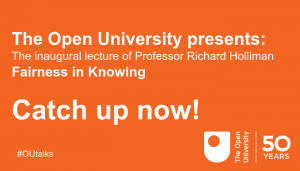During the summer holiday, I took part in a research placement with Dr Pallavi Anand in the School of Environment, Earth and Ecosystem Sciences at the Open University, organised by the Nuffield Foundation. The placement involved coding a MATLAB toolkit to a more accessible program such as Python that would use paleoclimate data to solve for past seawater temperature, oxygen isotope and salinity.
Geochemistry of the deep-sea mud to understand Monsoon

Samples crushed into a fine powder.
This summer I went on a research experience placement with The Open University’s School of Environment, Earth and Ecosystem Sciences (EEES). This was a seven-week project, funded by NERC (Natural Environment Research Council).
The project was to assist in a calibration of results obtained from deep-sea core sediment samples from two different sites around the Bay of Bengal.
The calibration is part of a wider project that my colleague, Emmeline Gray is working on for her PhD. This is looking at how the Indian Summer Monsoon (ISM) behaved during a past warm period (similar to predicted future conditions) by observing how certain parameters in the sea floor sediments at these sites vary over time. This could give an insight as to how climate change might affect our oceans over time.
Supporting a Nuffield Research Student

Sophie Alexander, The Open University.
Over the summer, I mentored a Nuffield Research Student.
I was originally interested in getting involved in the scheme to gain experience in teaching and mentorship.
The student, Zaibaa, worked to complete a pilot study, the results of which are now actively informing my PhD research direction.
My time mentoring Zaibaa was really valuable; it challenged me to teach the scientific method of hypothesis testing to someone else.
Further to this, I gained experience in project management and how to give feedback – which was harder than I thought!
I’d highly recommend other PhD students consider designing and mentoring a Nuffield student in the future, particularly if you’re interested in gaining experience of supervising projects.
Dr Pallavi Anand (project providers) supported my work as my PhD supervisor. I’m grateful for the the opportunity and funding from Nuffield Foundation.
Fishing in the Atlantic!

Zaibaa Mehmood, Luton Sixth Form College.
During my summer holidays, after my first year at college, I took part in a Nuffield research placement at the School of Environment, Earth and Ecosystem Sciences (EEES) at the Open University.
During this placement, I worked alongside a PhD student Sophie Alexander to analyse marine sediment (or mud in simple terms).
The main aim was to investigate surface ocean productivity in the Southern and Atlantic Ocean during the early Eocene. This was broken down for me into smaller aims as below:
- Create smear slides of mud samples from different sites
- Identify components on slides using a polarising microscope
- Compare analysis of 3 different sites and decide what changes there are and how they were caused
- Use the data gained to improve knowledge of ocean productivity during a warm greenhouse period.
Evaluating contemporary science
Effective communication is at the heart of good science. For as long as humans have tried to understand the natural world they have shared information and ideas, with a view to improving our collective understanding.
With the widespread adoption of digital tools for communication the potential for citizens to contribute to the sciences has never been greater.
The Open University has recently published a new Open Learn course that will help you to explore the evolving landscape of science communication, developing skills in critical evaluation, communication and engagement, whilst exploring a range of contemporary topics in science.
You can access the course here: Assessing Contemporary Science.
A longer version of these materials is available as an Open University module: Evaluating contemporary science.
Supporting the digitally-engaged scholar

Professor Richard Holliman, The Open University.
Earlier this year, as part of the Open University’s 50th Anniversary celebrations, the Graduate School ran a film-making project for 50 postgraduate researchers.
As part of the follow-up to this activity I ran two workshops yesterday to explore how researchers can develop a digitally-engaged strategy for communication and engagement.
The workshops are described below, and a copy of the slides is provided. If you’re looking for online resources to support the digitally-engaged scholar, this is a good place to start:
Exploring engaged research & knowledge exchange

Professor Richard Holliman, The Open University.
I’m off to the University of East London (UEL) today to deliver a keynote presentation at their 2019 Research and Knowledge Exchange Conference.
Thanks to UEL’s Head of Research & Knowledge Exchange Support, Matthew Whyte, I’ve had a chance to look at the abstracts for the conference. This has really helped in informing the talk I’m planning to deliver.
In working through your abstracts, I was impressed by the knowledge exchange work that is being undertaken by UEL researchers, who are engaging with a wide range of publics, community organisations, stakeholders and end-users.

2019 Research and Knowledge Exchange Conference
In particular, I was struck by how many of the abstract sought to address issues of social justice, not least because this echoes the mission of the Open University.
As a result, I’ll be exploring some of the similarities between the UEL and the Open University in terms of our research and knowledge exchange work.
I’ll argue that, to deliver on an ambitious programme of fairness in knowledge, requires a more nuanced take on what it means to increase our reach in our research and knowledge exchange activities, allied with a commitment to Engaged Research Design.
If you’d like to download a copy of my slides, select: Promoting epistemic justice through knowledge exchange.
Engaged Research: Why does this matter?

Professor Richard Holliman, The Open University.
Under the leadership of Sandy Oliver, Sophie Duncan and Pat Gordon-Smith, UCL Institute of Education, NCCPE and UCL IOE Press are running an all-day seminar on 7 May 2019.
We will be discussing progress to date, and the possible futures for Research for All, an open-access peer-reviewed international journal that launched in 2017.
The free movement of people and ideas

Professor Richard Holliman, The Open University.
Just over two weeks ago, I delivered my inaugural lecture on ‘Fairness in knowing’. It was such an honour to be part of this 50th anniversary programme of lectures.
If you’d like to watch a replay of the lecture, it’s available here: Fairness in knowing.
A sub-titled version of the lecture will be made available in due course.
I’m also planning to write up the key ideas from the lecture for publication.
I argued in the lecture that a key part of ‘fairness in knowing’ is recognising how ideas are generated and developed.
This is one of the really exciting things for me about being an academic; to see how knowledge and ideas travel across both national and cultural borders, and how they morph and adapt as they’re applied in a new context.
Fairness in knowing: How should we engage with the sciences?

Professor Richard Holliman, The Open University.
This year, The Open University celebrates its 50th anniversary. Happy birthday to us!
As part of this celebration, the university is hosting an exciting programme of events and activities.
Yesterday I watched my colleague Martin Weller discuss the ongoing (and increasing influence) of openness in education. (You can access a recording of Martin’s lecture from the link in the previous sentence. Scroll down to the bottom of the page to watch the recording.)
It seems fitting, given the complementary nature of our work, that I was scheduled to deliver my inaugural lecture in this programme shortly after Martin.
Watching the lecture
If you’d like to attend the lecture on 12th March (6-7pm GMT) in person, select How to register. (It’s free to attend, but you need a ticket.)
From 5pm on the day, colleagues will be demonstrating various examples of engagement outside the lecture theatre.
To watch the lecture online, select Watch the webinar. The link will become live shortly before the start of the event. You can submit questions via email or Twitter from the same page.
The lecture will be recorded and made freely available after 12 March.


